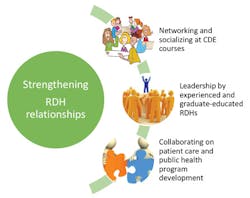Strong together
Strengthening relationships among dental hygienists
Christine Nathe
To advance dental hygiene and better serve the public, and more importantly, to experience better outcomes in oral health, dental hygienists need to strive to work together as a discipline. This collaborative unity could create strength in numbers and a wider-reaching voice than we’ve experienced to date.
The most effective movements in American history have not been accomplished by a group of experts, but by grassroots efforts of people working together. This means that as a profession we need to strengthen our relationships with other dental hygienists. Interestingly, when assessing RDH readers’ thoughts for topics they are interested in learning about, strengthening relationships was a common theme.
One study suggested that when physicians perceived an environment of trust, respect, cooperation, coordination, and shared responsibility from other health-care providers on their care teams, they reported increased identification with their profession.1 This finding is particularly applicable. When dental hygienists have frequent communication with other dental hygienists regarding patient care, they benefit. Dental hygienists must strive to stay connected within their practices, and also with other dental hygienists outside of their workplaces. This is important because many dental hygienists do not practice in an office with other dental hygienists, although this practice model is changing.
One analysis of nursing posed that professional socialization is a complex process with four critical attributes—learning, interaction, development, and adaptation.2 Comprehensive educational programs, competent role models, and the provision of adequate field experiences were found to be important and result in either positive or negative consequences for the professional development of nurses.2 Dental hygiene would be wise to apply this concept analysis.
Continuing education programs could focus on networking and socializing instead of having hygienists rely solely on lecture-style learning. Moreover, experienced and graduate-educated dental hygienists could lead by modeling skills that focus on the advancement of dental hygiene, such as creating innovative programs and researching treatment and behavior change theories that lead to better outcomes.
A few decades ago, dental hygienists identified key attributes and attitudes of the professional socialization process that are necessary to the continued growth and ability of its members to serve the needs of the public. They further stated that registered dental hygienists will need to identify and define the conceptual framework for the oral hygiene practice of the future.3 To begin with this development, dental hygienists must strengthen individual relationships to grow our professional association. Then as a group, we can develop a framework that will result in a strong and unified voice to advance dental hygiene in the future.References
1. MacArthur BL, Dailey SL, Villagran MM. Understanding healthcare providers’ professional identification: The role of interprofessional communication in the vocational socialization of physicians. Journal of Interprofessional Education & Practice 5 (2016) 11e17.
2. Dinmohammadi M, Peyrovi H, Mehrdad N. Concept analysis of professional socialization in nursing. Nurs Forum. 2013 Jan-Mar;48(1):26-34. doi: 10.1111/nuf.12006.
3. Gillis MV, Praker ME. The professional socialization of dental hygienists: from dental auxiliary to professional colleague. NDA J. 1996 Summer;47(1):7-13.
CHRISTINE NATHE,RDH, MS, is director at the University of New Mexico, Division of Dental Hygiene, in Albuquerque, N.M. She is also the author of “Dental Public Health Research” (www.pearsonhighered.com/educator), which is in its fourth edition with Pearson. She can be reached at [email protected] or (505) 272-8147.


